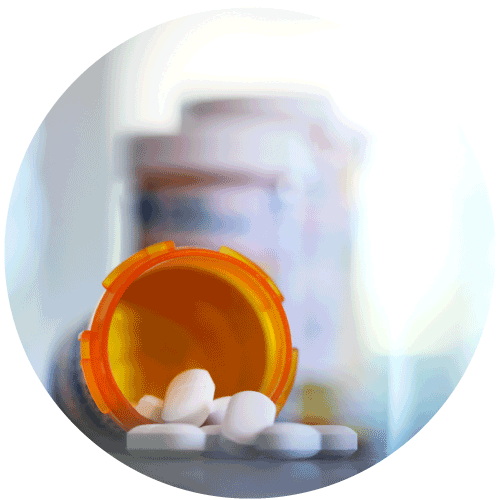I go to these meetings because things could get worse.
A man at my home group said these words not too long ago. He’s a person I respect: a father, husband, and veteran who still exudes such a degree of military bearing I find it hard to imagine that he ever had an addiction problem. He represents the power of the program: We become the parents, friends, life-partners, and citizens we always were meant to be. He is clearly living a life in which The Promises have come true, deservedly so, but his words show the wisdom behind those promises.
We go to these meetings because we must continually maintain what we need to stay safe. Our social connectedness. Memories of the past. Gratitude for the present. The daily maintenance of our spiritual condition. They protect us in case things should get worse.
When I spoke at the 2ndAnnual Trauma and Addiction Conference hosted by The Meadows this last January in Scottsdale, my first few PowerPoint slides about the current state of the drug overdose epidemic showed good news. In 2018, the Centers for Disease Control (CDC) reported a 4.1% decrease in drug overdose deaths over 2017, and although fentanyl-related deaths rose, their climb had slowed. Deaths from prescription opioids and heroin were also falling, the CDC reported in 2020.

The hard work of raising public awareness about opioid addiction, naloxone distribution, and the expansion of Medication-Assisted Treatment (MAT) for opioid use disorder paid off. I expressed hope that when the CDC released data for 2019 overdose deaths would have declined further — not just a plateau but a true downward trend. Perhaps then we could say that we survived the worst of the drug overdose epidemic of the early 21stcentury.
This summer, the CDC released the data for 2019, and, unfortunately, things got worse.
Preliminary data show that 71,999 people died from drug overdoses in 2019 — a record number of deaths and a 4.6% increase over the previous year. Even as I spoke in Scottsdale, the gains made in 2018 had already been wiped out.
Preliminary data show that 71,999 people died from drug overdoses in 2019 — a record number of deaths and a 4.6% increase over the previous year.
Fentanyl is simply too lethal a drug to go quietly. It shrugged off all that work on increased awareness, naloxone distribution, and expanded MAT. Counterfeit oxycodone tablets containing fentanyl are becoming more common in Western states such as California and Arizona, historically dominated by black tar heroin. In some intermountain states, heroin is disappearing entirely. And in the Northeast, in states that had managed to avoid methamphetamine, deaths related to cocaine and methamphetamine now outnumber deaths from heroin alone, according to the CDC’s 2020 report.
Then, on top of this bad news about 2019, health departments in 30 states and several cities started to report spikes in overdose deaths in the first half of 2020 according to the issue brief: “Reports of increases in opioid-related overdose and other concerns during COVID pandemic.” In Cook County, Illinois, 1,180 people died from opioid overdoses as of July 14— twice the number as the same period in 2019. Half of those who died were African American, even though they represent less than 25% of the population, as reported in the article “Opioid Overdoses Keep Surging in Chicago, Killing Black People on the West Side.”Florida experienced a 10% increase in overdose deaths in the first four months of 2019. Delaware had a 60% increase. Of the 30 states reporting, the overall increase in overdose deaths in the first half of 2020 is 13%, according to The New York Times. Since March, 62% of counties participating in the Overdose Detection Mapping Application Program (ODMAP) have seen increased numbers of overdoses. May alone showed a 42% increase. EMS responders and EDs are seeing a shift in calls and visits from COVID sufferers to overdose victims. Overdoses are up not just because of the COVID pandemic, but they are accelerating with each week it persists.
In these two data streams from the CDC and ODMAP we see the lesson of how fragile sobriety can be. Even when we survive the worst of our addiction, gains made are lost easily, aggravatingly.
So things got worse, and now we must redouble our efforts to carry the message of recovery to those who are in despair and at risk, provide the best treatment and support we can, exhaust every harm reduction strategy, and work as hard as we can to ensure access to the treatment the evidence best shows can work to heal opioid use disorder.
Of the 80 patients assessed and followed by our MAT Team in 2019, 73% completed treatment on naltrexone-based or buprenorphine-based forms of MAT.
At The Meadows, we are well into our second year of providing Medication-Assisted Treatment in the context of care we know works best and holding true to the principles of 12-Step recovery. Of the 80 patients assessed and followed by our MAT Team in 2019, 73% completed treatment on naltrexone-based or buprenorphine-based forms of MAT.
We believe MAT is a powerful tool to stop overdose deaths in the United States. We have seen it save lives and we feel, especially in light of this month’s new data, it mustbe used to its maximum benefit. The mindful caution of our MAT team, the in-depth discussion of each patient several times weekly, leaving no stone unturned, allows us to provide the best, evidence-based care for opioid use disorder in keeping with the principles and practices of the kind of recovery that has worked for nearly a century and has saved many of our own lives as well.
Each month we build our relationships with MAT prescribers, quality aftercare programs (including our own Meadows Outpatient Centers), and reputable recovery residences across the country. From the beginning of the pandemic, The Meadows has increased its telehealth capacity. We are becoming experts in this new form of care and plan to make it a permanent part of our case management capability.
This month we added a specialized workshop for our patients who want to strengthen their knowledge and practice of 12-Step principles. I’m proud to be working alongside Jennifer Angier, Vice President of Addiction Services. All of our clients, but especially our MAT patients, benefit tremendously from her insights about recovery and her personal experience of three decades of solid sobriety in AA. Our workshop attendees leave The Meadows with a working understanding of the terms “powerlessness” and “unmanageability,” but also of “gratitude” and “serenity.” They see how it all fits together – MAT and 12-Step philosophy. We believe the addition of this workshop solidifies our reputation as one of the strongest 12-Step oriented addiction treatment programs in the world.
These are scary times, to be sure. But we were already survivors of one epidemic, and everything we lived through and survived has prepared us for this one. If we can stick together, if we can make sure no one has to go through early sobriety alone, we will emerge resilient, even stronger than before, and show the world how we become the parents, friends, life-partners, and citizens we always were meant to be.
RESOURCES:
- Blaney-Cohen, D. (July 8, 2020). “Issue brief: Reports of increases in opioid- related overdose and other concerns during COVID pandemic.” American Medical Association, Advocacy Resource Center.
- Eldeib, D., & Sanchez, M. (July 14, 2020). Opioid Overdoses Keep Surging in Chicago, Killing Black People on the West Side.ProPublica.
- Katz, J., Abby, G., & Margaret, S.-K. (2020, July 15). “In Shadow of Pandemic, U.S. Drug Overdose Deaths Resurge to Record.” The New York Times.
- Products – Vital Statistics Rapid Release – Provisional Drug Overdose Data. (2020, July 15).
- Wan, W., & Long, H. (2020, July 1). “‘Cries for help’: Drug overdoses are soaring during the coronavirus pandemic.” The Washington Post.

